What Science Says About the Cardio Habits That Slow Aging
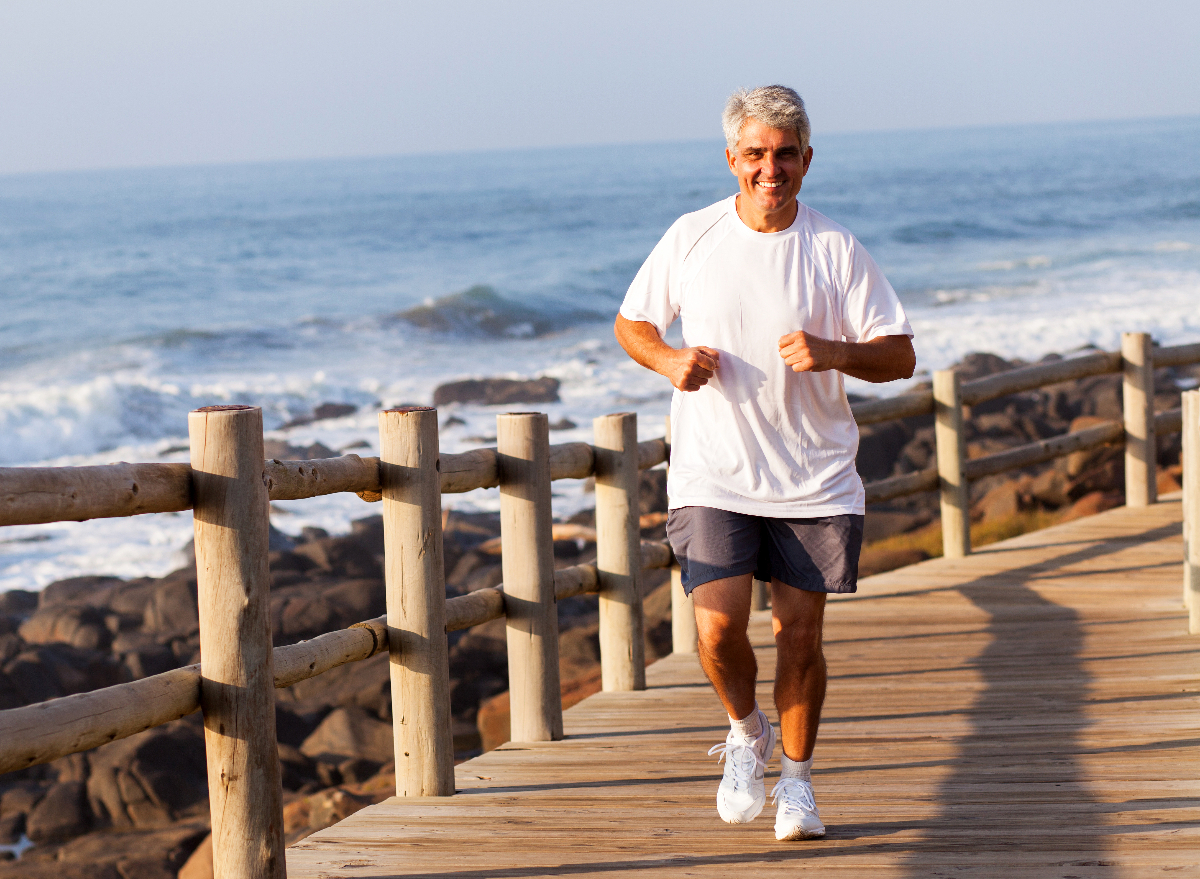
Ah, how lovely would it be to remain forever young? Although Father Time has yet to share a magical potion that'll keep us youthful for all of eternity, there are some things you can do yourself to ensure you're living your best, healthiest, and fittest life. Of course, you need to get a sufficient amount of sleep to keep your cells from aging and eat a well-balanced, nutritious diet. (Some of the longest-living people in the world consumed plant-based foods and fewer processed meats.) In addition to that, working exercise into your regular routine is critical to leading a long, healthy life. With all this in mind, we dug deeper into what science says about the cardio habits that slow aging. Read on to learn more, and next up, don't miss The 6 Best Exercises for Strong and Toned Arms in 2022, Trainer Says.
Don't sleep on strength training
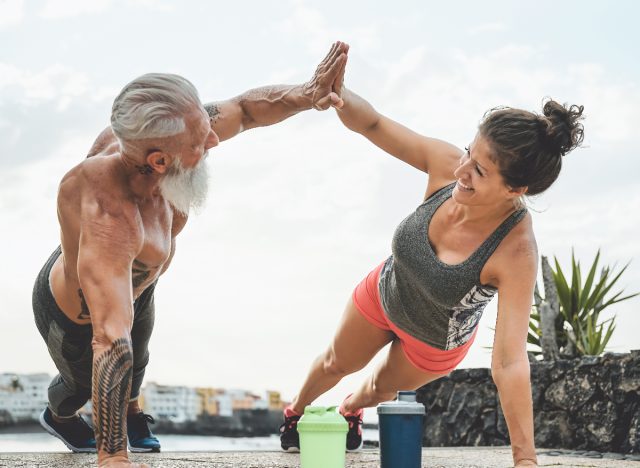
Let's start off by noting that in addition to the cardio habits that slow aging, strength training is a must-do in order to sculpt a fit body as you age. Growing older unfortunately comes with the loss of lean muscle mass if you don't do anything on your part to preserve it.
Researchers from the National Institute on Aging have been busy studying strength training and its benefits for over 40 years. Lucky for us, they've pinpointed plenty of ways it can have a positive impact on older individuals. They found that strength training can help you enhance your mobility, maintain lean muscle mass, and lengthen a healthy lifespan.
Usually, strength and muscle mass rise on a steady incline from the time you are born until you're 30 to 35 years old. Once you hit this "peak," the performance and power of your muscles start to gradually decline. The National Institute on Aging explains that this natural decline can be slowed down, so long as you continue to lead an active, fit life.
Related: How I Learned To Slow Aging and Live Better on a Wellness Retreat
Taking a brisk walk every day is linked to stronger bones and muscles, less stress, and a better immune system
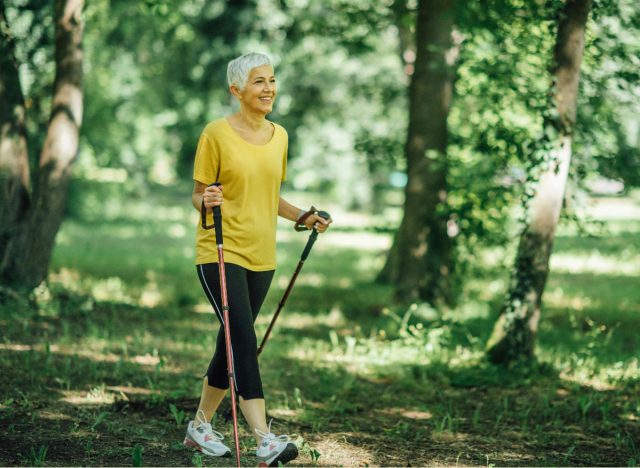
Now, let's head into the cardio habits that slow aging. Heading outdoors or hitting up the treadmill for a brisk walk every day can be a positive step towards leading the long life you desire. According to Mayo Clinic, this super-simple, yet effective, form of cardio has its benefits; it helps you reduce stress (which could lead to early death), build a stronger immune system, boost your energy levels, and strengthen your muscles and bones. In addition, going for a brisk walk can help you avoid or manage certain health issues like high blood pressure, heart disease, type 2 diabetes, stroke, and cancer.
Of course, make sure you're doing all the right things for your body before, during, and post-walk. This includes choosing the right walking shoes, warming up, and stretching after you cool down.
Related: The #1 Workout To Lead an Incredibly Healthy Lifestyle, Says Trainer
Running can give your mental health a major boost
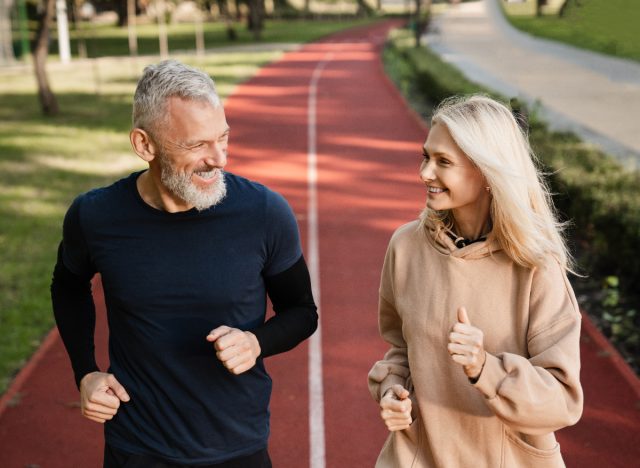
Lace up your sneakers, head out for a run, and get ready to reap the wonderful benefits. A study of 14,000 participants conducted by Asics during the coronavirus pandemic discovered that 82% of runners in the UK believe that this form of cardio is a great way for them to clear their heads. Seventy-eight percent say running helps them feel more levelheaded (via Coach Mag).
And it doesn't stop at just running. An article in The Primary Care Companion to The Journal of Clinical Psychiatry says that aerobic exercises like walking, jogging, cycling, swimming, dancing, and even gardening have been proven to lessen depression and anxious feelings. The article also mentions that exercise can enhance one's cognitive abilities.
Cardiovascular exercise like swimming is gentle on the joints and presents a low risk of getting injured
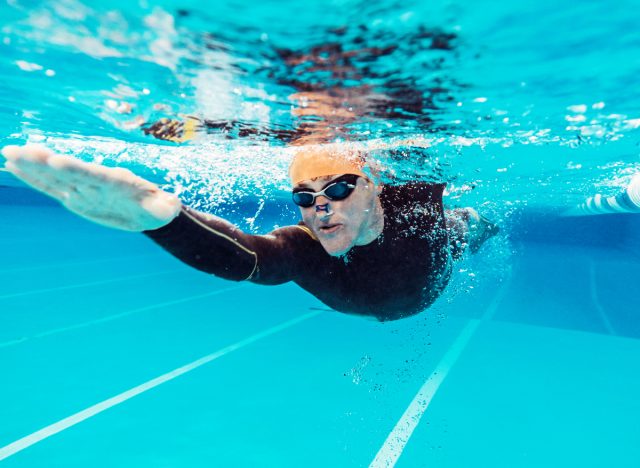
As far as the best cardiovascular exercises for older individuals are concerned, the International Sports Sciences Association has some recommendations. These include low-intensity walking, swimming (aka water aerobics, which is super gentle on the joints and presents a very low risk of getting injured), cycling, and rowing (which works your whole body).
Exercise can help reverse the negative effects of living a very sedentary lifestyle

A research study performed at the University of Texas Southwestern Medical School shows just how detrimental "bed rest" can be to your health, further proving the point that regular exercise is necessary.
Five 20-year-old men, all in good health, participated in the study, which had them dedicating three full weeks during their summer break to bed rest. The team ran tests on the participants before and after their bed rest, and let's just say, the results after their time in bed were quite disturbing. The men experienced increased body fat, quicker resting heart rates, a decrease in the heart's max pumping capacity, and a decrease in muscle strength (via Harvard Health Publishing).
The researchers took this study a step further by having the participants complete a fitness program for eight weeks. Working out basically overruled the damage that was done from being on bed rest.








